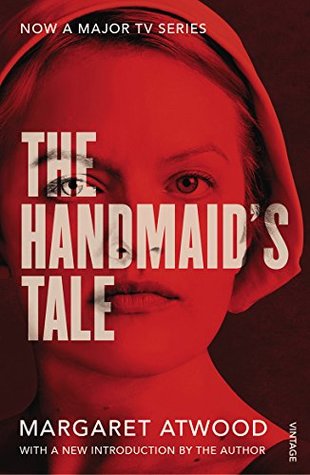Reviewed by Amber (The Literary Phoenix) on
"We slept in what had once been the gymnasium."
Offred lives in a world where her name no longer matters. She is no longer considered a person - she has no right to hold property, choose her own clothing, read, use body lotion, or love. Offred is an object, but she remembers the time before. She remembers her friends, her mother, her husband, her daughter. She is not supposed to remember. Offred, like all other women, is to forget her humanity and embrace her new role in life - to breed.
What a demeaning and horrifying life.
Let's talk about Offred.
The story is told in first person. Most of this is Offred's thoughts, observations, and memories. The story is written in such a way that we learn about three different time periods of Offred's life: Her life before, her time at the Red Centre, and the present. I really liked this format - it shows us her whole story. It also shows us the silence. Every flashback is time that Offred is alone and rather than rush through these moments to the "exciting" ones, Atwood uses this time to reflect on the quiet in their lives and show us how it came to be.
It took me a couple chapters to figure out, but there's a method to Atwood's madness in her use of quotation marks. This drives a lot of people crazy, but once I realized what was going on, I loved it. Noticing where there are and aren't quotation marks gives you a better level of understand of how ostracized Offred is. Few few people talk to her, especially at the beginning of the book. Some because of rules, others because they hate her. By no fault of her own. It's really interesting.
Overall, I think the writing is brilliant.
Atwood's style is subtle and the ideology is not forced upon the reader. You're simply seeing a little bit of time into one woman's life at a leisurely pace. Dystopias have largely focused on being bigger, darkest, with greater shock value... but sometimes something as subtle as this can have a greater impact. I found The Handmaid's Tale shocking in both its feminist narration as well as the idea of controlling a society through sex and and sin... or the lack thereof. Through removing free will of who to love - because remember, even the Wives are "chosen". It well written, a manageable pace in a manageable number of pages. We see Offred grow as she rebels in her remembering, in the way she talks, and in the offers she accepts. The world is well defined but not forced upon the reader with long, tedious descriptions. I found the "holy rollers" and the wall both equally telling and foreboding about the society.
All in all, just brilliant, really. Worth a read, but read it slowly and carefully or you will miss the subtle nuances.
Nolite te bastardes carborundorum, my friends.
"And so I step up, into the darkness within; or else the light."
CHECK OUT MY BLOG FOR MORE REVIEWs.
Reading updates
- Started reading
- 31 August, 2017: Finished reading
- 31 August, 2017: Reviewed
